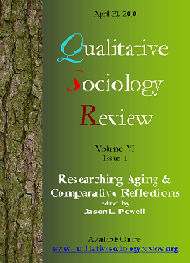The Life Course Metaphor: Implications for Biography and Interpretive Research
DOI:
https://doi.org/10.18778/1733-8077.6.1.02Keywords:
Third age, Qualitative gerontology, Meaning making, Meaningful engagementAbstract
This paper reviews qualitative research in the United States, highlighting the ways research has changed in the era of the third age. With growing attention to positive and uplifting aspects of aging, qualitative research has played a critical role in the exploration of the ways in which older adults are engaging in meaningful ways with others. We describe two key methodological approaches that have been important to examining positive aspects of aging and exploring the extent to which a growing number of years of healthy retirement are redefining the aging experience: ethnographic research and grounded theory research. We also review key topics associated with qualitative research in the era of the third age. These topics fit within two dominant frameworks – research exploring meaningmaking in later life and research exploring meaningful engagement in later life. These frameworks were critically important to raising attention to meaningful experiences and interactions with others, and we propose that the agenda for future qualitative research in the United States should continue contributing to these frameworks. However, we note that a third framework should also be developed which examines what it means to be a third age through use of a phenomenological approach, which will assist in the important task of theory building about the third age.
Downloads
References
Arxer, S., J. W Murphy and L. L Belgrave (2006) "Globalization and the politics of time." Pp. 51-60 in Re/defining the matrix, edited by B. Anke, M. Schultze and A. Stopińska. Frankfurt Ann Main: Peter Lang.
Google Scholar
Bergson, H. (1967) Time and free will. NY: Harper & Row.
Google Scholar
Bulter, R. N. and H. P. Gleason (1998) Productive aging. NY: Springer.
Google Scholar
Bury, M. R. (1982) "Chronic illness as biographical disruption." Sociology of Health and Illness 49(2): 167-168.
Google Scholar
DOI: https://doi.org/10.1111/1467-9566.ep11339939
Elder, G. H. Jr. (1978) "Family history and the life course." Pp. 17-64 in Transitions, edited by T. K. Hareven. NY: Academic Press.
Google Scholar
DOI: https://doi.org/10.1016/B978-0-12-325150-3.50008-8
Elder, G. H. Jr. (1994) "Time, human agency, and social change: Perspectives on the life course." Social Psychology Quarterly 57(1): 4-15.
Google Scholar
DOI: https://doi.org/10.2307/2786971
Fish, S. (1989) Doing what comes naturally. Durham, NC: Duke University Press.
Google Scholar
DOI: https://doi.org/10.2307/j.ctv11317d7
Flaherty, M.G. (1999) A watched pot: How we experience time. NY: NYU Press.
Google Scholar
Gubrium, J. F. and J. A. Holstein (1995) "Life-course malleability: Biographical work and deprivation." Sociological Inquiry 65(2): 207-23.
Google Scholar
DOI: https://doi.org/10.1111/j.1475-682X.1995.tb00413.x
Gubrium, J. F. and J. A. Holstein (2003) "Analyzing interpretive practice. " Pp. 214-248 in Strategies of qualitative inquiry, edited by N. K. Denzin and Y. K. Lincoln. Thousand Oaks: Sage.
Google Scholar
Habermas, J. (1984) The theory of communicative action, Volume I: Reason and the rationalization of society. Boston: Beacon Press.
Google Scholar
Habermas, J., (1987) Theory of communicative action, Volume II: Lifeworld and system: A critique of functionalist reason. Boston: Beacon Press.
Google Scholar
Harris, D. A. and D. Parisi, “Mimmo”. (2007) "Adaptive life history calendars for qualitative research on welfare fare transitions." Field Methods 19: 40-58.
Google Scholar
DOI: https://doi.org/10.1177/1525822X06292707
Heidegger, M. (1962) Being and time. NY: Harper& Row.
Google Scholar
Hittlin, S. and G. H. Elder (2007) "Time, self, and the curiously abstract concept of agency." Sociological Theory 25(2): 170-91.
Google Scholar
DOI: https://doi.org/10.1111/j.1467-9558.2007.00303.x
Holstein, J. A. and J. F. Gubrium (1995) The Active interview. Thousand Oaks: Sage Publications.
Google Scholar
DOI: https://doi.org/10.4135/9781412986120
Holstein, J. A. and J. F. Gubrium, (2000) Constructing the life-course. Dix Hills, NY: General Hall.
Google Scholar
Holstein, J. A. and J. F. Gubrium, (2003) “The life course.” Pp. 835-855 in L. T. Reynolds & N. J. Herman-Kinny (Eds.), Handbook of symbolic interactionism . Lanham, MD: Altimira.
Google Scholar
Holstein, J. A. and J. F. Gubrium, (2007) "Constructionist perspectives on the life course." Sociology Compass, 1:1-18.
Google Scholar
DOI: https://doi.org/10.1111/j.1751-9020.2007.00004.x
Holstein, J. A. and J. F. Gubrium, (2008) "Constructionist impulses in ethnographic fieldwork." Pp. 373-395 in Handbook of constructionist research. NY: The Guilford Press.
Google Scholar
Husserl, E. (1966) The phenomenology of internal time-consciousness. Bloomington: Indiana University Press.
Google Scholar
Husserl, E., (1970) The crisis of European sciences and transcendental phenomenology. Evanston, Ill: Northwestern University Press.
Google Scholar
Husserl, E., (1975) Paris lectures. The Haque: Martinus Wijhoff. Karp, David & Yoels, W. C.
Google Scholar
DOI: https://doi.org/10.1007/978-94-010-1703-9
Husserl, E., (1982). Experiencing the life-cycle. Springfield, IL: Charles C. Thomas.
Google Scholar
O’Rand, A.M. (1996) The vulnerable majority: Older women in transition. NY: National Academy on Aging.
Google Scholar
O’Rand, A.M. and M. L. Kreckler (1990) "Concepts of the life-cycle: Their history, meaning, and uses in the social sciences." Review of Sociology 16: 241-62.
Google Scholar
DOI: https://doi.org/10.1146/annurev.so.16.080190.001325
Reinharz, S. (1992) Feminist methods in social research. New York, NY: Oxford University Press.
Google Scholar
Rowe, J. W. and R. L. Kahn (1998) Successful aging. NY: Pantheon Books.
Google Scholar
Russel, C. (2007) "What do older women and men want? Gender differences in the ‘lived experience’ of aging". Current Sociology 55(2): 173-92.
Google Scholar
DOI: https://doi.org/10.1177/0011392107073300
Shutz, A. (1962) Collected papers, Vol I. The Haque: Wijhoff.
Google Scholar
Smith, D. (1987) The everyday life as problematic: A feminist sociology. Boston, MA: Northeastern University Press.
Google Scholar
Downloads
Published
How to Cite
Issue
Section
License

This work is licensed under a Creative Commons Attribution-NonCommercial-NoDerivatives 4.0 International License.











